My current Italian teacher is a 38-year-old police inspector in Naples. He’s got deep green eyes, dresses beautifully and always nabs the perpetrator. Wealthy, aristocratic women throw themselves at him, and not just because he’s also a baron.
Under his guidance, my comprehension, both written and oral, has made great progress.
Even though he plies his trade in the 1930s and is fictional.
Luigi Alfredo Ricciard has taught me a lesson helpful to anyone trying to learn a language: Reading books in which you already know and love the characters is a great motivator.
I’ve been studying Italian on and off for more than 20 years, with decidedly mixed results. I can handle some ordinary situations, I can understand some of what Chiara, my real teacher, says (She assures me that few of her students understand her completely, by design). And, thanks to a lot of Duolingo, I have a grammar and vocabulary base.
But I don’t get much of what I see on TV and, even though Chiara is very nice about it, my spoken Italian is quite brutto. So I’m always looking for new ways to hone my skills.
I first encountered Ricciardi, the hero of Maurizio de Giovanni’s bestselling mystery series, when Charlie and I planned our trip to Naples last year. As a mystery fiction reader and writer, I always seek out locally written detective novels set in the city I’m visiting.
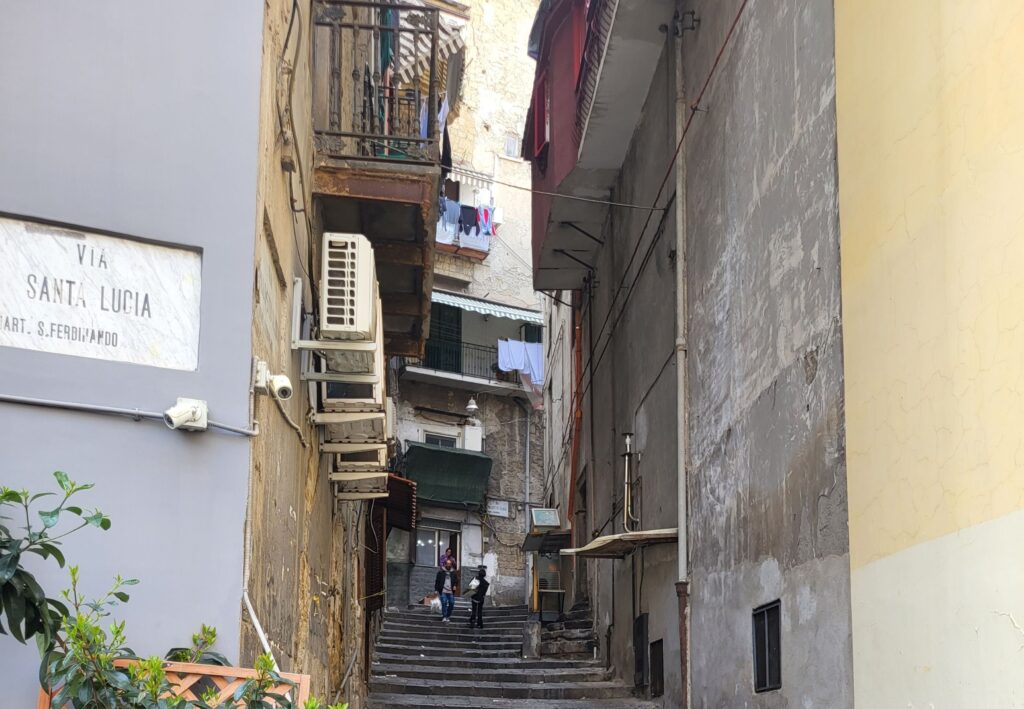
I devoured most of the first 10 Ricciardi books, in translation, during and after my trip. Ricciardi has an unusual gift, or perhaps it’s a curse: He can see and hear the ghosts of murder victims speaking at the moment of their demise. This helps professionally, but wreaks havoc with any hopes of a private life, since he can’t turn it off.
Yet the inspector is in love. In the second book, he looks out the window of his elegant apartment and into the window of the more modest flat across the street. Inside, a tall, awkward young woman is embroidering. Her name is Enrica, and she sees him, too.
As the series progresses, they meet and exchange words, and more words, while continuing the longing glances through the window. But there are two obstacles: Enrica’s parents would never want her to marry a policeman. And Ricciardi cannot risk marrying and passing on his cursed visions, which he inherited from his late mother.
I found myself following this love drama as much as the mysteries, as with Dorothy Sayers’s Lord Peter Wimsey and Harriet Vane, or, outside the genre, Patrick O’Brian’s Aubry-Maturin series.
But I hit a snag when I came to Ricciardi No. 11: It hadn’t been translated into English.
I wrote anyone I could think of to see if it would be: the author, the publisher, the translator, the Ricciardi Facebook fan page. In English to some, in fumbling Italian to others. I either got no answer, or no one knew.
There was only one choice. I went to the Tour de Babel Italian bookstore on the rue du Roi de Sicile and awkwardly asked if they had “Purgatorio dell‘Angelo.” They did, and the next one, “Il Pianto dell‘Alba” (The Cry of Dawn). I walked out with both.
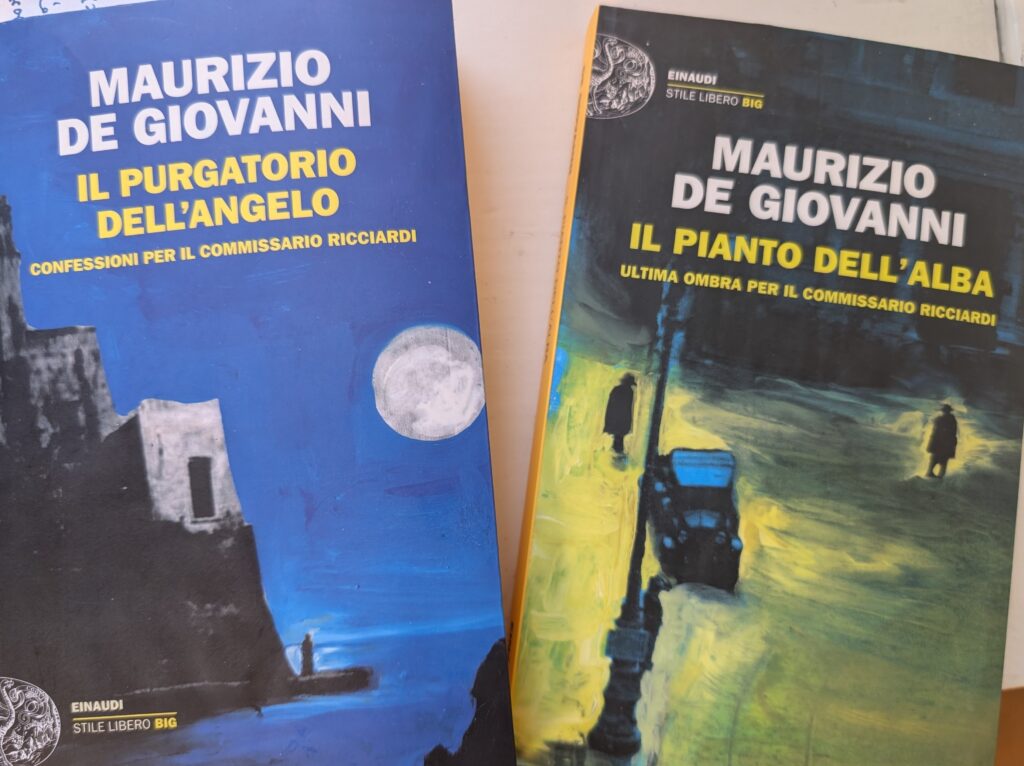
It was slow going. I tried balancing the book in one hand and my dictionary in the other, looking up the minimum number of words that would allow me to follow the plot. It got a little easier when I switched to Google Translate, but I was still researching a lot of words.
I did have a key advantage: I already knew the characters and their backstories. I knew that Ricciardi’s No. 2, Brigadiere Bruno Maione, had a heart of gold that was broken when his son, Luca, was killed early in his career as a police officer. I knew that Enrica’s father, Giulio, was more inclined than her mother to let Enrica get to know this handsome policeman.
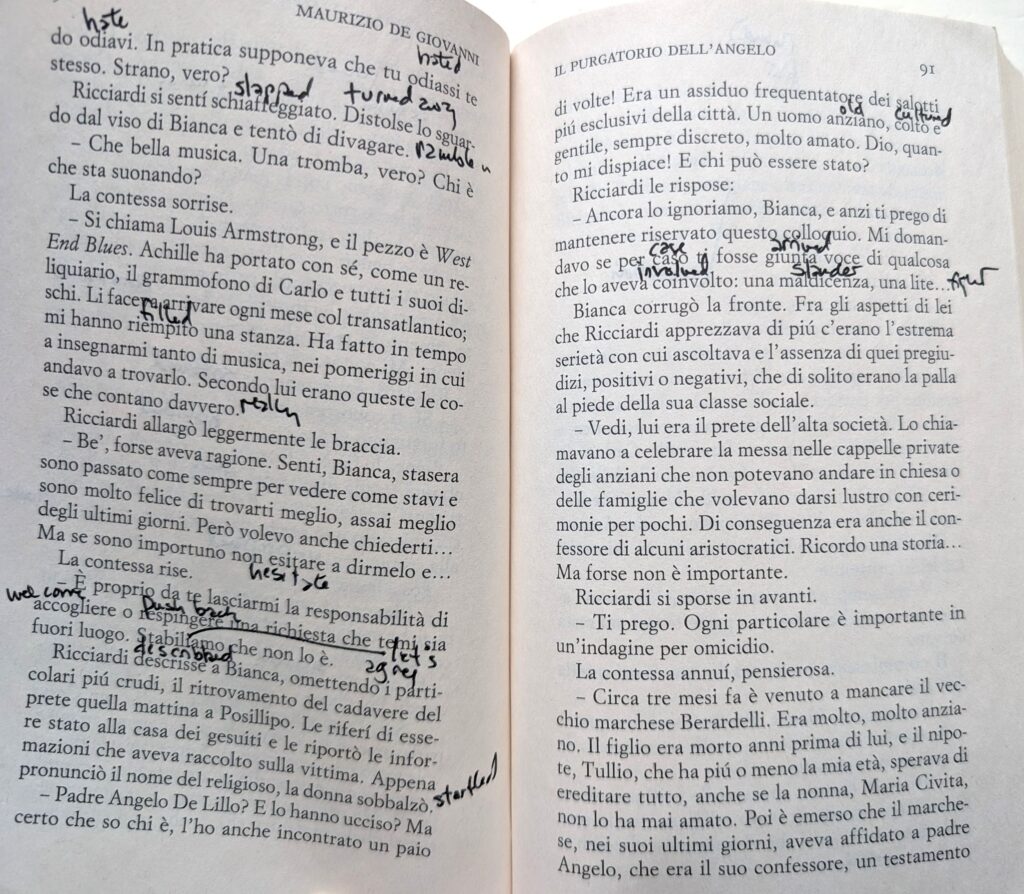
But I had made little progress until Chiara told me she was going on maternity leave for a few months.
“What should I do to keep learning Italian?” I asked.
“Watch and listen,” she said. “Podcasts, videos, TV. Without subtitles.” Chiara practices a kind of whole-Italian method, where speaking and understanding are more important than the niceties of grammar. I used to think it didn’t work until I noticed I was speaking better and understanding more in our online lessons.
I had already seen the two seasons of the television series on Rai TV, where Ricciardi is played by the impossibly gorgeous Lino Guanciale.
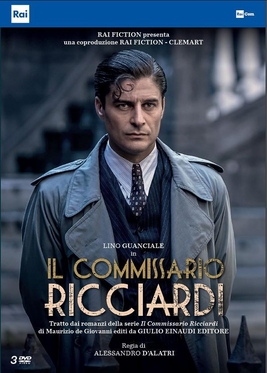
Credit: Rai TV
But with subtitles.
Just then, my Ricciardi fan page exploded with the news that “Volver” (Return), the 18th and probably last volume of the series, had just been published.
This is the video of the book’s launch, at the Teatro Acacia in, of course, Naples.
It may only be accessible only to those on Facebook. Here’s a short bootleg version to give you the idea.
I’d seen a lot of book launches, but none like this. More than 1,000 people packed the theater (clearly I’m not the only Ricciardi fan). A trio of musicians played a melncholy accompaniment. Lino Guanciale read Ricciardi and the part of Maione was spoken by the author himself (the one with the gravelly voice and silver hair). Two spoiler alerts: The girl seated on the stage plays Marta, Ricciardi’s young daughter, and no one plays Enrica. I’d already done a little snooping around about later volumes so this was not a total surprise.
The video goes on for more than 90 minutes. Sadly, I’m having trouble understanding most of it, but I’m following Chiara’s instructions to relax and just pick out words I do understand. I’ll keep at it. And I can always read the book. At the rate I am consuming no. 11, I should get to it in about seven years.
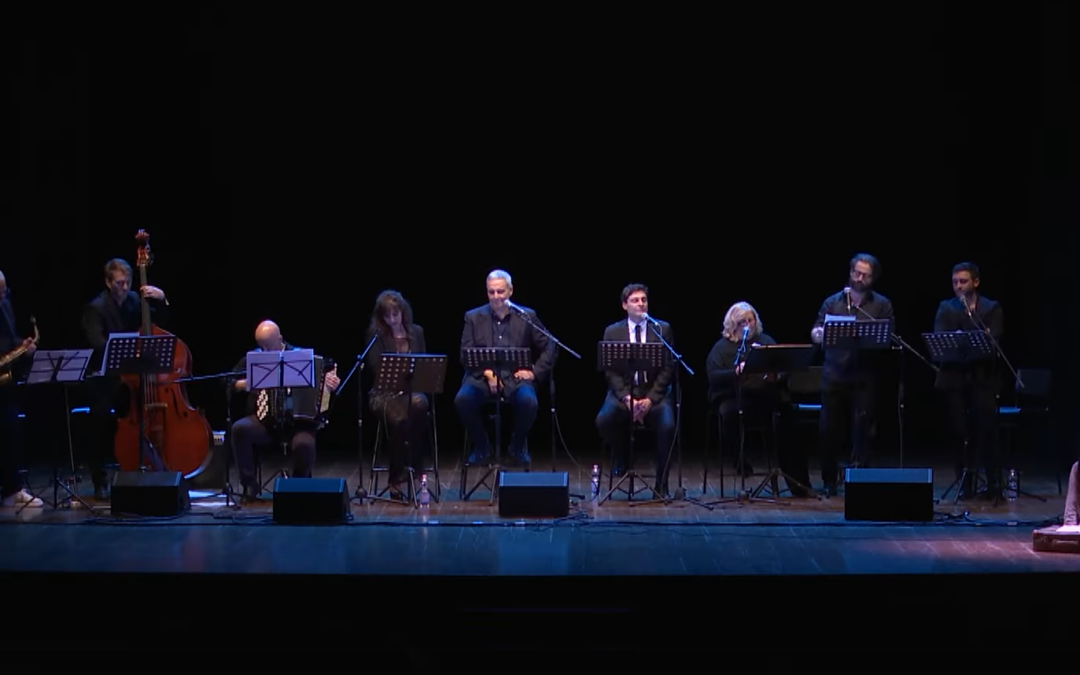
Oh boy, a new detective series to immerse myself in. And set in Naples, which I feel somewhat familiar with after devouring Elena Ferrante’s My Brilliant Friend novels and TV series. I really enjoy your blog posts, Anne!
Thanks so much, Sally! And yes, the Ricciardi series has that same misty, dark feeling as Ferrante IMO.
Lovely piece
Thank you, Bruce!
Thanks, Anne, for entertaining tips on learning a language. I’m currently working in Chittagong, where I don’t speak a word of Bangla or the local dialect. Italian with Ricciardi is more appealing.
Sounds interesting, though!
Learning French with reading comprehension my best competence, listening second and regrettably speaking dead last. My grammar base is not bad due to high-school emphasis on it and subsequent online Babble and self study. However I lucked in as my wife is French hence I can challenge complex reads without Google. Good luck with your Italian.
Thanks so much!
Anne, another great post! I have taking Italian classes with La Ville de Paris. I think my level B1.2 is a bit inflated. I am diving into the Ricciardi books! One question : how did you managed to watch the RAI TV series? Thank you
Jacques, I watch Commissario Ricciardi on Rai Play from Durham, NC USA. I use a VPN service (Express VPN but there are others).
I am Italian American and study Italian and exclusively watch RAI Play. The “series” on Rai have Italian subtitles that Google Translate on my computer translates to English.
I enjoy it molto!
Hi Anne another great post! I have been taking weekly Italian lessons with La ville de Paris for two years. I am diving headfirst in reading books about Ricciardi. One question: how did you manage to watch the RAI TV series?
Thank you, Jacques! I’m glad you liked the post. For a while I had the bouquet italien on Orange, so it may have been through that, but I think more likely I got it on streaming (I can’t remember what channel). I also watched My Brilliant Friend, which I recommend as well.
I watch the TV show on Rai Italia with a VPN. There are Italian subtitles that Google translates to English on the spot. It along with”Un Professore” is my favorite series.